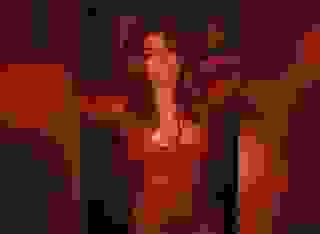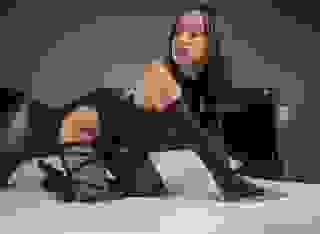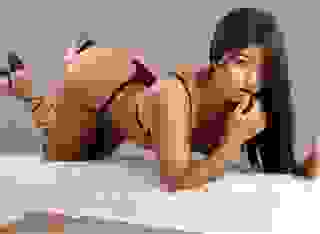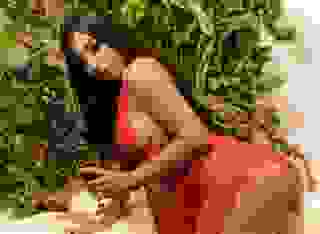- Sci-Fi & Fantasy
- Recovery Mission
Note: You can change font size, font face, and turn on dark mode by clicking the "A" icon tab in the Story Info Box.
You can temporarily switch back to a Classic Literotica® experience during our ongoing public Beta testing. Please consider leaving feedback on issues you experience or suggest improvements.
Click hereFirst, there was the woodland trail, and birds singing in every tree. Jillian felt the dirt of the path between her toes, and her father's hand was warm in her own, large and calloused; comfortably, protectively cradling her small fingers.
'Daddy, where is the witch's house? Can we see the gingerbread on it?'
'Honey-sweet, it's just a little ways further on, just around that bend up there, do you see it?'
Jillian peered ahead into the dark green gloom. 'Sure, daddy?'
'I'm sure, honey. It's your birthday, so we're going to eat gingerbread. Let's go find it, okay?' And with that he swung her laughing hysterically up onto his shoulders. Her father strode down the path, strong, young and confident, carrying his daughter effortlessly. The summer woods all around were silent and still.
They came to a clearing, and there, just as her father had promised, was the gingerbread house. Maybe it was a bit smaller than the fairy story had said, and no witch was to be seen, but it was gingerbread, with icing and candy shutters and cookie shingles and marzipan doors, and her mommy was there, and her little sister too, all standing around the miniature house.
'Happy Birthday, sweetheart', said her father as he swung her down. Jillian ran across the soft grass toward the house. 'Daddy, it's just like the fairy story, isn't it?' 'Didn't I say so, darling?' he replied. 'Oh, yes Daddy, it's bootiful!' He smiled and knelt down, and her mother knelt on her other side.
'Happy Birthday to you,
Happy Birthday to you,
Happy Birthday...'
The sky flamed. The long shadows under the trees vanished in a glare of hot yellow, blink-blink, and her mother screamed, throwing her arms around Jillian. Her daddy yelled in surprise, and with a force she'd never known before he threw his wife and Jillian down onto the cool, aromatic earth, shielding them with his body. The ground began to dance, and through the woodland came the satanic roar, and the trees whipped insanely, and the sky burned, and the shards of gingerbread bounced wildly on the rolling ground.
___________________
She awakened.That fucking day, she thought.All gone in a day. God. Slowly her trembling eased. It was twenty years ago, and now she came out of sleep in this year of grace 2096. Twenty years since the world ended. She hadn't known then that the madmen across the sea would decide to trigger their long-hidden hellbombs, each secreted away in an American city; nor had she known of the response which had devastated the greater part of two other continents. All she had known was that her gingerbread house had died, and when the ground stopped shaking her mother had lain still, eyes open, head lolling oddly, and her father, face graven of stone, had wept and wept beside her, and her young sister had never moved, not at all, even though her eyes were closed as if she slept, covered by the massive tree limb which has smashed her down.. At last, her father had gathered young Jillian to him, saying never a word, and walked through the shattered wood toward their home. Far away, on the orange horizon, flames had leapt.
Her father had survived, long enough to walk and walk and walk from their home, with a rucksack on his back carrying compressed food and Jillian on his shoulders, far away and far away, to his friends in the country—'business friends', he called them—who took him and her in. He had died soon after, worn out by grief and exhaustion. After that the bad years started, when the weather was strange, and crops would not grow, and her new 'Aunt and Uncle' looked anxiously out whenever the winds were in the west, from where the city had once been. As Jillian grew older, she began to hear the stories: entire populations starved in the surviving cities; strange cancers afflicting young and old alike; monstrous births which lived a matter of days or hours, mercifully. The invisible death lay on the land, altering genes, warping bodies, affecting minds.
By the time she was twenty, the world before her birthday was a fading dream of peace and plenty and love. Her rural district had escaped the worst effects, and in time her foster aunt and uncle sent her to learn. 'Learn all you can', they said. 'It's all we have left. If humanity is going to survive, we must preserve the knowledge, and we must find a way to overcome this curse'.
So Jillian learned. She learned in the primary school, and in the high school, taught by volunteers. She attended the local agricultural college where aging chemicals lurked in slowly rusting containers. She learned genetics. She learned agronomy. She learned how the radiation had created a deadly legacy that outlived the blasts. She learned, while one by one the hydrogen-powered autos stopped working, and the electric grid became ever less reliable.
And then, one day, two years ago, the survey team had come to the district. For long years communication with the outside world had been restricted to occasional, precious forays made by hydrogen-powered cars, but as the means to make more pure hydrogen failed, the cars sat idle. Lately they'd used horses—right back to the 19th century, she thought bitterly. But then the newcomers had arrived, in a hoverplane of all things, descending from the heavens like gods, broadcasting their advent via shortwave, and landing outside Brentley, the largest remaining village in the area.
What a day that had been. Five men and women had climbed out of the plane's hatch, each neatly dressed in zipsuits, each bearing a patch emblazoned 'United States'—a name of nearly mythic significance. The old men had wept, the young had stared blankly. They were polite enough, though very formal. The team needed no provision; indeed, they shared what they brought—compressed, self-heating foods not seen for two decades. And they asked questions: who ruled the district? What was the population now? Five years ago? Ten? Twenty? Were there any records of local radiation levels? How many stillbirths in the last year? Were the men fertile? The women? With each pessimistic answer the extent of the catastrophe was borne in on the assembled locals. Young Tom over by Fairlee, he was known because he could sire children, and him only eighteen, but almost no other young men could. And the children: well, sir, the young ones, born after The Day, they were often, well...something was wrong. You just knew those that weren't going to be okay. Will Sanford, he had no immune system, and he lived about five days; and there was little Caren, who grew up, but she had no intelligence at all, and just stared vacantly. And there were Bill Owens' boys, one born without arms, the other seemed to be fine, but he went completely insane when he was ten and had finally thrown himself into the river and died. And the dreary litany went on, and the neatly dressed men and women took notes, speaking quietly into their recording equipment.
On the last day, the survey team had asked the village headman if he knew of any 'capable, intelligent' young men or women who might want to help in the work of recovery. Jillian was called in from her work at the college and offered the opportunity to leave with the team.
'It's important work, Miss Camacho', the team leader said. 'We're trying to stitch society back together. Nothing less. And we see this same pattern over and over: falling populations, technology loss, resource depletion. Within twenty years your home district will be back to the days of plagues and witchcraft. We're trying to stop the decay, and you have a decent background in genetics. We NEED people like you to help us help everyone else.
'We can give you more education, and the chance to make a difference. What we manage to achieve will be spread by teams like ours across the old territories of the United States. Maybe—if we're lucky—we'll build a better society. But we need everyone we can get, now. The US had 350 million people before the attack. We had 190 million after. A year later, it was down to 40 million. Five years, down to 10 million. We now estimate that, what with lack of medicine, mutational disorders, infertility, and the like, we'll have fewer than six million, and still not stable, within another two years. And to be blunt, the rest of the world is no better off.'
She took the offer.
Jillian lay in her bed, listening to the soft susurration of the blowers, recovering from her recurring nightmare. Here, in the heart of the Vasquez Genetic Research Center she was at home, and it had been so for two years. Good food, and plenty of it; educated, intelligent, committed coworkers; and a view of the world much larger than anything she'd known at home. Here, at least, technological civilization continued. When she'd arrived she'd been surprised by the smallness of the facility—perhaps 100 souls labored here, trying desperately to undo the damage wrought by the deadly dust. She'd been assigned to a team whose sole role had been to research therapies that might repair the gaps and tears in the double helix. They possessed enormous resources: the accumulated knowledge of two centuries lay in the reclaimed data cores; and the computers were very nearly sentient in their own right.Yeah, the wisdom of the ancestors,she thought bitterly. We're feeding on it like parasites, hardly knowing what they achieved, or how, just praying that the datasets will provide an answer if we play with them in the right way. Parasites.And she turned, and slept, in this year 2096.
Jillian was awake early the next day; she always arose early, as if to make the most of what time there was—and time was growing short indeed. Though radiation levels had steadily decreased, the population was decreasing too, victim to ancient diseases and famine. Step on a rusty nail, and die. Catch a bad cold, and live in fear that you might take to bed, never to leave it again. If the insects ate your silage, you might have no fodder for your cows. It was becoming 'positively medieval out there', as Lucy, her team leader, once said in bitter frustration.
The research establishment was divided into two groups. One, the Alternative Strategies team, led a rather secluded, secretive existence to one side of the fenced compound out in the Arizona desert. The other, Genetic Remediation, was Jillian's group. Their assigned task was to collate data—human genome data—from the salvaged datacomps removed, often at great risk, from the wrecked universities. Some—much—of the data was hopelessly garbled by gamma radiation; others had to be painfully pieced together. It was like working a jigsaw puzzle whose pieces were scattered throughout the countryside. What data was successfully collated was copied to the A/S group for further study, and Jillian's team attempted to use it to work on therapies which might repair the torn strands and skeins of the population's genes. Much had been done prewar in the field of recombinants; some had been salvaged. Of that data, all had been copied to the A/S group, whose members' evasiveness and aloof behaviour made them generally unpopular.
Another morning in the communal refectory; if nothing else, the teams ate well.Probably some foodprep robots were salvaged, she thought.Wonder how long before they die too? Ron sat at the next table. Ron, the assured. Ron the arrogant. Ron the ass. Jillian despised him: Ron was fit, athletic, self-assured, and effortless in his offhand put-downs. He caught her glance, raised his coffee cup in ironic greeting, and went back to his reports, for all the world as if she didn't exist.
Jack at least was nice; she gathered he'd lost his beloved to some illness a few years back. He never said much; a self-contained strength lay within him, though. They worked together on the sequencing, trying to make sense of the old data. As if the thought called the man, Jack sat down opposite her. 'Morning, Jack'.
'Hi, Jillian. What's new today?'
'Nothing, really. Another fun day, huh?'
'Yeah, well, I'll be in the trenches with you, Jillian. Um, look, later on I'm going to go out to the desert, you know, just to hike. Got to clear my head, you see'. He smiled uncertainly. 'So I was wondering if you'd like to come with, if you aren't busy?'
She smiled. 'Yes, I'll come. Where to?'
'Just about five miles out to those cliffs up north. I think they may have some old Amerindian dwellings, and it's kind of a hobby. Weird, huh? Not very useful these days.'
'It's not weird at all. Say about four? We should have enough light 'til nine or so at this time of year; maybe two hours out, two back, and an hour there.'
The hike was pleasant; Jack liked her, that was plain. He looked at her with pleasure.Not much to see, anyway. I'm skinny as a rail, black hair, I look like some wild Indian woman. Once or twice she caught herself admiring his easy stride and unflappable approach to all obstacles.
When they returned, he stood close to her in the desert twilight. 'Thank you for coming, Jillian. Nobody has wanted to, before.' Quickly, shyly, he kissed her on the cheek, blushed, and hurried off. She stood looking after him.I like you too, Jack. A lot. You're like—well, like my dad the way I remember him.
The next day, the one which changed her life, started out routinely enough. At breakfast, Ron came over to her. 'Hiya, Jilly', he said. 'Listen, Dr. Lai, our director, asked me to ask you to come see her today, around 1:30. Can do?'
'Uh, yeah, sure. Why?'
'Oh, if I told you it'd be no secret, and 'sides, then I'd have to kill you.' He laughed madly.Nutcase, she decided.
After lunch she walked across the compound to the A/S complex, a set of low white adobe-cladded buildings which housed the personnel, research labs, and offices. She was directed to Lai's office, a plain affair containing only a Spartan desk, a handcomp and monitor, a diploma from some long-vaporized university, and a few books, of all things. Perhaps she liked antiques?
Lai stood. 'Jillian Camacho? Karen Lai. Thank you for coming; please, sit down.
'Did Ron say anything? No? Good. Well, let me keep this short. As you know, our teams are trying to find ways to remedy the drastic damage done to the gene pool. Without some cure, we'll see the proportion of healthy adults continue to decrease, and as the population dies off, the ability to maintain a technic civilization will diminish. We estimate, absent intervention, that the tip-over may be as little as two to five years away. In that space, we must somehow create a healthy gene pool, so that in 15 to twenty years we have a post-war generation of fully healthy young adults. We will still be around to teach them, but we cannot wait too much longer, or the last pre-war survivors will be dying too fast to pass on our knowledge to any new generation.'
She flicked her hand at the comp, which lit up obediently. 'This is a graph of current trends'—pointing to an amber line which angled sharply down, then stabilized almost at the graph's bottom—'this is if your group finds a cure in the next five years'—the blue line was nearly the same as the amber. 'And this is what we've been working on'. A red population line that dipped, stabilized in five years, and began to climb again—steeply.
'Your team has been trying to sequence the human genome so we can study it and find possible gene replacement strategies. Frankly, progress is a lot slower than we'd hoped. Don't be defensive; this is simple fact, no reflection on your group. We cannot wait another 10 years hoping for a breakthrough. Too much research yet to do.
'Our group has been using what data you have sent us, along with gene modification work done pre-war, to come up with what we think is a viable alternative...'
REPORT SUMMARY, ALTERNATIVE STRATEGIES RESEARCH GROUP, 12 NOVEMBER 2096
Vasquez' initial goal was to find some means to repair the genetic damage within the larger US population. To that end we have been given priority of materiel and personnel by what remains of the US government and local entities. We regret to say that this strategy, while promising in the long term, will not meet its targets. We possess too little coherent data and lack the necessary expertise to engineer pan-specific cures. Moreover, even when the genome is fully identified once more, we expect curative research to occupy several more years.
To address this scenario, the Alternative Strategies team was founded. This team, working with available data and utilizing pre-war research into radical genetic modification, notably those used to cure genetic maladies such as cystic fibrosis, eg, has proposed a second solution. Rather than relying on possible cures for the existing genetic structure, this team proposes to use healthy genes as a template, to modify the gene carriers to be able to quickly replicate their genes, and thus to create a viable healthy population. In summary, rather than curing the sick, we propose to use nature's own resources—a healthy gene pool—by modifying select characteristics in the healthy twenty percent of the populace to achieve a higher reproductive rate.
'So you want, um, any healthy women and men to, well, get laid a lot and have a lot of kids? It sounds fun, I suppose, but...'
'Yes, sort of, Jillian. But just getting unaffected men and women together won't do it. Population will continue to drop, rapidly. Think of it: successful pregnancy requires a man and a woman who are attracted to each other, and the characteristics which create attraction are incredibly complex. You might like one man, and another woman dislikes him. Much of it is based on biochemistry.
'Moreover, you have to like each other enough to want to sleep together. Then, you have to do so often enough that you become pregnant, assuming that you WANT to become pregnant. And in this world of ours, overall health is not always optimal for ensuring successful pregnancy, either. Meantime, assuming that one male makes on female pregnant, our social mores are such that she won't want him off impregnating other women. And so on. Basically, all these factors put a hard brake on any chance of 'sleeping together' being the solution.'
'What, then?'
'We propose something different...'
APPENDIX C: PROPOSAL, ALTERNATIVE STRATEGIES GROUP, KAREN E. LAI, MD.
...this strategy would require use of undamaged volunteers to test those genetic and psychological modifications we have settled upon. The full programme is expected to require approximately two weeks, during which trial period the subject would be provided a daily oral dosing of targeted genetic modification agents. It is expected that the subject would initially feel some flu-like symptoms as his/her body acclimatized to a group of radically different gene structures, but that this would disappear as the body assimilated to and was modified by those structures. Each such agent would target specific genetic sequences and modify them to create a new organism capable of rapid, successful reproduction. Such changes, in metabolism, endocrine, immune, respiratory, pheromonal, and above all reproductive systems would require high caloric intake, a carefully monitored environment, and daily adjustment of targeted doses. The conversion is designed to be quick, for ease in administration in the field to targeted healthy individuals. Key areas would include in both sexes:
Higher oxygen uptake, providing rapid metabolic usage of calories for both the conversion process and for prolonged sexual activity afterward. The subject would experience this as a feeling of well being.
Significant strengthening of key muscle groups and organs, specifically the cluster of pelvic muscles, vaginal/penile support, etc.
Modification to blood chemicals to dramatically enhance arousal states and shorten arousal time. Target would be to create in female subject a susceptibility to arousal by mere proximity to a modified male, while feeling no arousal around unmodified males (to avoid impregnation by genetically-damaged individuals). The same would of course be true of modified males.








